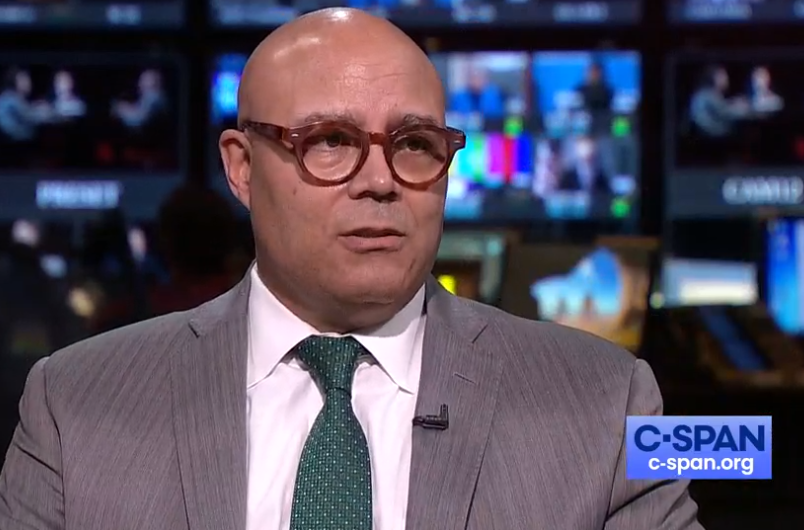NCTA's Powell Cites D.C.'s Tech Whiplash

The smarter way to stay on top of broadcasting and cable industry. Sign up below
You are now subscribed
Your newsletter sign-up was successful
Michael Powell, president of NCTA-the Internet & Television Association, says edge providers' reversal of fortune since the 'halo" days of the Obama Administration is the biggest case of policy whiplash he has seen.
Powell was being interviewing for C-SPAN's Communicators series, which airs Saturday, March 30, at 6:30 p.m. ET and on Monday, April 1, at 8 a.m. and 8 p.m. on C-SPAN2.
The former FCC chairman also said talk of the cable industry's demise is premature, in part thanks to broadband, which relieves some of the competitive pressure on video. He said cable is still thriving as a "consumer delivery system," but that it is definitely in transition.
Talking about the former haloed, now somewhat horned, edge providers, he called them a "data hegemony" over info only "meekly or marginally" available to others. He said there was no doubt about the fact that Washington was getting tough on tech, which he called the biggest whiplash he had ever seen in terms of policy and public sentiment.
It was only a few years ago that the edge was still viewed as plucky startups--despite their burgeoning market cap and absorbing of hundreds of companies--a point Powell was quick to make.
During the Obama Administration, said Powell, edge providers could do no wrong, walking around the town with a halo over their heads and telling the narrative of how they weren't evil and were connecting the world. "Their origin myths were all positive, and I think politicians drank that Kool-Aide pretty aggressively for the last decade or so."
He said the "shocking" turnabout since the 2016 election may be a bit overdone, but it was also overdue for a sector that had been allowed to power up and heavy up without "particularly thoughtful scrutiny."
The smarter way to stay on top of broadcasting and cable industry. Sign up below
Powell, a former Justice antitrust division attorney, said that kind of vigilance is what is overdue, and sees it coming.
He said the next big antitrust case will be Google, which he clarified meant that company as an exemplar of Big Tech writ large rather. He said that case will define antitrust for the foreseeable future.
Powell commended Sen. Elizabeth Warren (D-Mass.) for teeing up the issue of breaking up Facebook and Google and Amazon, but said structural remedies were harder than they sounded. He also pointed out that these companies "kill competitors in their cradle, not when they are rival size," which is at a stage where antitrust says: "That's not a big merger."
Related: Delrahim Says When It Comes to FANG, Big May Not Be Bad
He said that is an antitrust challenge, as is the fact that they are all free and antitrust usually deals with affect on prices. "I am getting this great free product, how am I harmed by the fact that Facebook bought WhatsAp?"
Powell said the key is to understand how data is market power.
He said it might sound flip, but the edge and ISPs are actually frenemies. "You can have Comcast fighting Netflix [as they have over why content was being slowed and by whom] about one set of things while at the same time you have a deal to put Netflix in the cable set-top box."
He said there is a sort of Alice in Wonderland quality to the relationships where "you can't hold a grudge very long."
Related: Powell Says Facebook Troubles Expose Mythology of Openness
As to how ISPs and broadcasters and over-the-top should be regulated, Powell said there needs to be some coherent overarching regulatory philosophy. He said that until Congress can come up with that coherent world view, there will be bad public policy gamed by various interests. He said bad public policy is "always my enemy."
Powell said privacy will be the critical issue of the digital age, for instance, how many decision, how much choice, should be turned over to an algorithm. He said that is the question that taking more of someone's data prompts.
He said it also affects the civility of a society, knowing when not to say something. That is also because all that data is out there. Who gets to collect data, the jet fuel for market dominance, and why.
Powell said a big difference between cable/broadband providers and the edge is that cable is not an "ad-fueled mob." He said they make money, but it is not by taking everything they know about their customers and selling it, so it is a different relationship that does not result in the same kind of abusive practices one reads about weekly about Facebook or Google.
"We take your check, and so we don't just take your life story and make our money like that," he said.
Contributing editor John Eggerton has been an editor and/or writer on media regulation, legislation and policy for over four decades, including covering the FCC, FTC, Congress, the major media trade associations, and the federal courts. In addition to Multichannel News and Broadcasting + Cable, his work has appeared in Radio World, TV Technology, TV Fax, This Week in Consumer Electronics, Variety and the Encyclopedia Britannica.

